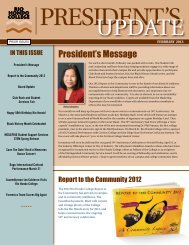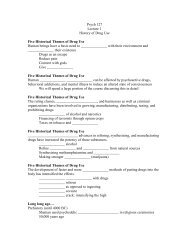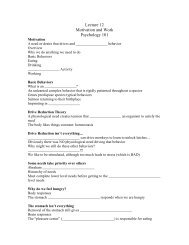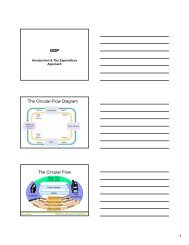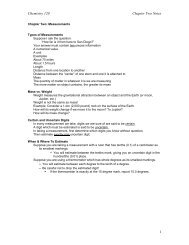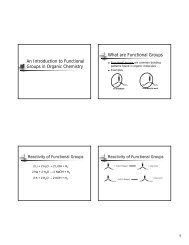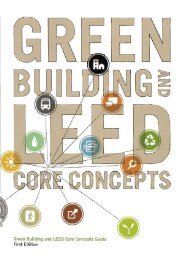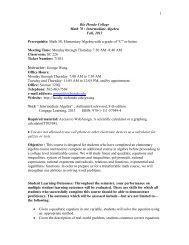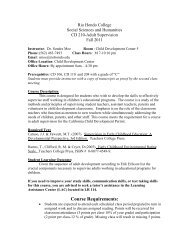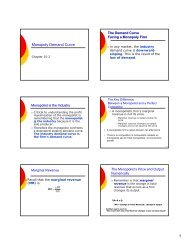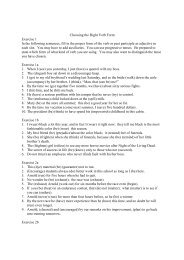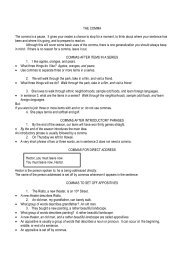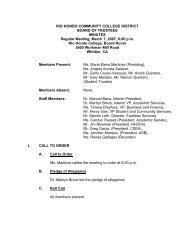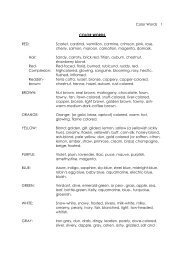Complete College Catalog 2011-2012 - Rio Hondo College
Complete College Catalog 2011-2012 - Rio Hondo College
Complete College Catalog 2011-2012 - Rio Hondo College
Create successful ePaper yourself
Turn your PDF publications into a flip-book with our unique Google optimized e-Paper software.
Other circuits covered are mixers,<br />
converters, inverters and switching<br />
power supplies. This is primarily a<br />
course for electronics majors.<br />
4 Units<br />
54 Lecture hours<br />
54 Lab hours<br />
ELEC 211<br />
Advanced Digital Electronics<br />
Prerequisite: ELEC 111<br />
Transfers to: CSU<br />
This course is an analysis and<br />
application of digital circuits. This<br />
course extends the foundation work<br />
of Digital Electronics 111. Emphasis<br />
will be placed on the study of various<br />
types of Counters, A/D and D/A<br />
Converters, I-O Devices, Memories<br />
and an introduction to Micro<br />
Computers. Through laboratory<br />
work, students learn applications<br />
by constructing various circuits and<br />
devices. This course is intended for<br />
Electronics Majors.<br />
4 Units<br />
54 Lecture hours<br />
54 Lab hours<br />
ELEC 240<br />
Microprocessors and Microcomputing<br />
Prerequisite: ELEC 211<br />
Transfers to: CSU<br />
This course will provide the student<br />
with a fundamental knowledge<br />
of the general architecture of<br />
microcomputers. Students will<br />
learn about the CPU and some of<br />
the I/O devices used to interface<br />
the CPU to various peripheral<br />
devices. Microprocessor architecture,<br />
instruction set, and addressing modes<br />
will be emphasized. This is a course for<br />
Electronic and Computer Technicians.<br />
4 Units<br />
54 Lecture hours<br />
54 Lab hours<br />
___________________<br />
ELECTRONICS/<br />
ELECTRIC UTILITY<br />
TECHNOLOGY<br />
Division of Career & Technical<br />
Education<br />
EUT 110<br />
Electrical Utility Technology I<br />
Advisory: ENGL 035 or ESL 198 or<br />
appropriate assessment; READ 023 or<br />
appropriate assessment; MATH 030 or<br />
appropriate assessment; ELEC 050<br />
Transfers to: CSU<br />
This is an introductory course that<br />
will examine the theory behind<br />
present day utility energy systems.<br />
This course provides an orientation<br />
in the power distribution and<br />
line construction industry. Basic<br />
electrical principles and safety on the<br />
job are emphasized. Topics include<br />
basic mathematical computations,<br />
including trigonometry<br />
fundamentals, electron theory and<br />
the fundamentals of magnetism.<br />
Students will combine electrical<br />
theory with laboratory and practical<br />
applications in the course of study.<br />
This course is intended for students<br />
that are contemplating a career in<br />
the electrical utility industry.<br />
3 Units<br />
45 Lecture hours<br />
27 Lab hours<br />
EUT 112<br />
Electrical Utility Technology II<br />
Prerequisite: EUT 110<br />
Advisory: ENGL 035 or ESL 198 or<br />
appropriate assessment; READ 023 or<br />
appropriate assessment; MATH 030 or<br />
appropriate assessment; ELEC 050<br />
Transfers to: CSU<br />
This course involves the study of<br />
the power distribution and line<br />
construction industry. Topics include<br />
methods of producing electricity, A.C.<br />
and D.C. meters and circuitry and<br />
electric batteries. Students will also<br />
learn about Ohm’s Law, Kirchhoff’s<br />
Law, and electromagnetic induction.<br />
This course is intended for students<br />
that are contemplating a career in the<br />
electrical utility industry.<br />
3 Units<br />
45 Lecture hours<br />
27 Lab hours<br />
EUT 114<br />
Electrical Utility Technology III<br />
Prerequisite: EUT 112<br />
Advisory: ENGL 035 or ESL 198 or<br />
appropriate assessment; READ 023 or<br />
appropriate assessment; MATH 030 or<br />
appropriate assessment; ELEC 050<br />
Transfers to: CSU<br />
This course is a study of alternating<br />
current circuits, A.C. and D.C. motors<br />
and generators, pole and overhead<br />
construction, and transformers and<br />
voltage regulators. Topics include<br />
schematics, shunt and series capacitors<br />
and safety issues outlined by the<br />
Occupational Safety and Health Act<br />
(OSHA). Calculating power used by<br />
electrical circuits is also covered. This<br />
course is intended for students that are<br />
contemplating a career in the electrical<br />
utility industry.<br />
3 Units<br />
45 Lecture hours<br />
27 Lab hours<br />
EUT 116<br />
Electrical Utility Technology IV<br />
Prerequisite: EUT 114<br />
Advisory: ENGL 035 or ESL 198 or<br />
appropriate assessment; READ 023 or<br />
appropriate assessment; MATH 030 or<br />
appropriate assessment; ELEC 050<br />
Transfers to: CSU<br />
This course is a continuation of pole<br />
and overhead line construction. Topics<br />
covered include state safety orders for<br />
line construction and maintenance,<br />
transmission and distribution systems<br />
and conductors and electrical systems<br />
faults. Students will also learn about<br />
short circuits, system protective<br />
concepts and how to identify control<br />
circuits from wiring diagrams. This<br />
course is intended for students that are<br />
contemplating a career in the electrical<br />
utility industry.<br />
3 Units<br />
45 Lecture hours<br />
27 Lab hours<br />
EUT 118<br />
Electrical Utility Technology V<br />
Prerequisite: EUT 116<br />
Advisory: ENGL 035 or ESL 198 or<br />
appropriate assessment; READ 023 or<br />
appropriate assessment; MATH 030 or<br />
appropriate assessment; ELEC 050<br />
Transfers to: CSU<br />
This course covers advanced theory<br />
of electrical distribution lines and<br />
systems. Other topics include phasing,<br />
system groundings, substations and<br />
the use of electrical instruments.<br />
Students will also learn how to connect<br />
transformers in accordance with the<br />
state code. Usage of fusing tables and<br />
reference tables, including technical<br />
symbols are also covered. This course<br />
is intended for students that are<br />
contemplating a career in the electrical<br />
utility industry.<br />
3 Units<br />
45 Lecture hours<br />
27 Lab hours<br />
EUT 120<br />
Utility Pole Climbing Techniques<br />
Advisory: ENGL 035 or ESL 198 or<br />
appropriate assessment; READ 023 or<br />
appropriate assessment; MATH 030 or<br />
appropriate assessment<br />
Transfers to: CSU<br />
This course is designed to provide<br />
instruction on climbing a utility<br />
pole safely using the latest OSHA<br />
fall resistant requirements. At the<br />
completion of this course, students<br />
will be able to safely ascend and<br />
descend a utility pole using gaffs<br />
and extension ladders. This course<br />
provides an orientation in the power<br />
distribution and line construction<br />
industry. Basic electrical principles and<br />
safety on the job are emphasized. This<br />
course is intended for students that are<br />
contemplating a career in the electrical<br />
utility industry.<br />
4 Units<br />
54 Lecture hours<br />
54 Lab hours<br />
____________________<br />
EMERGENCY<br />
MEDICAL TECHNICIAN<br />
Division of Public Safety<br />
EMT 093<br />
Emergency Medical Technician<br />
Prerequisite: FTEC 121<br />
Advisory: ENGL 035 or ESL 198 or<br />
appropriate assessment; READ 023 or<br />
appropriate assessment; BIOL 125<br />
This course is designed to certify<br />
students as California State<br />
Emergency Medical Technicians and<br />
gain employment as an ambulance<br />
driver or ambulance attendant. After<br />
successful completion of this course,<br />
students will be authorized to take the<br />
National Registry EMT examinations<br />
and then request certification as<br />
an EMT through the Los Angeles<br />
County Department of Health or<br />
other local EMS accrediting agencies.<br />
Topics discussed include pre-hospital<br />
care terminology, cardiovascular<br />
emergencies, pre-hospital childbirth,<br />
communicable disease, extrication<br />
<strong>2011</strong>-<strong>2012</strong> <strong>Catalog</strong> <strong>Rio</strong> <strong>Hondo</strong> <strong>College</strong> / 175



